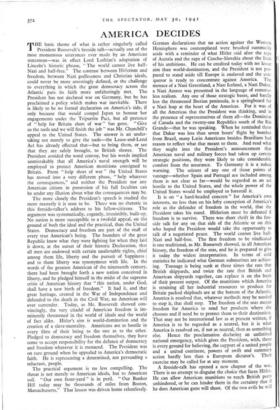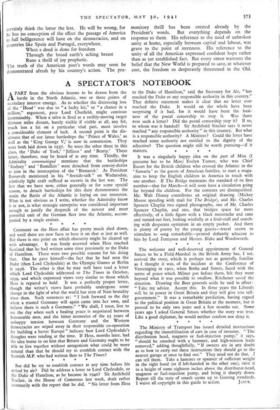AMERICA DECIDES
THE basic theme of what is rather singularly called President Roosevelt's fireside talk—actually one of the most momentous utterances ever made by an American statesman—was in effect Lord Lothian's adaptation of Lincoln's historic phrase, " The world cannot live half- Nazi and half-free." The contrast between Hitlerism and freedom, between Nazi godlessness and Christian ideals, could never be more arrestingly defined, or the challenge to everything in which the great democracy across the Atlantic puts its faith more unfalteringly met. The President has not declared war on Germany, but he has proclaimed a policy which makes war inevitable. There is likely to be no formal declaration on America's side, if only because that would compel Japan to honour her engagements under the Tripartite Pact, but all pretence of " help for Britain short of war " has gone. " Give us the tools and we will finish the job " was Mr. Churchill's appeal to the United States. The answer is an under- taking not merely to give the tools—the Lease-and-Lend Act has already effected that—but to bring them, or see that they are safely brought, to British shores. The President avoided the word convoy, but his words implied unmistakably that all America's naval strength will be employed to protect American munitions consigned to Britain. From " help short of war " the United States has moved into a very different phase, " help whatever the consequences," and neither the President nor any American citizen in possession of his full faculties can be under any illusion about what the consequences may be.
The more closely the President's speech is studied the more masterly it is seen to be. There was no rhetoric in this fireside-talker's address to his fellow-citizens. The argument was systematically, cogently, irresistibly, built-up. No nation is more susceptible to a twofold appeal, on the ground of both the ideal and the practical, than the United States. Democracy and freedom are part of the stuff of every true American's being. The founders of the great Republic knew what they were fighting for when they laid it down, at the outset of their historic Declaration, that all men are endowed with certain unalienable rights, chief among them life, liberty and the pursuit of happiness ; and to them liberty was synonymous with life. In the words of the greatest American of the nineteenth century, there had been brought forth a new nation conceived in liberty, and he pledged himself in the midst of the supreme crisis of American history that " this nation, under God, shall have a new birth of freedom." It had it, and that great heritage, created in the War of Independence and defended to the death in the Civil War, no American will ever surrender. Today, as Mr. Roosevelt showed con- vincingly, the very citadel of American freedom is im- minently threatened in the world of ideals and the world of fact alike. Hitler's aim is world-domination and the creation of a slave-mentality. Americans are as hostile in every fibre of their being to the one as to the other.
Pledged to democracy and freedom themselves, they have come to accept responsibility for the defence of democracy and freedom wherever it is menaced. The President was on sure ground when he appealed to America's democratic faith. He is representing a determined, not persuading a reluctant, people.
The practical argument is no less compelling. The threat is not merely to American ideals, but to American soil. " Our own front-yard " is in peril. " Our Bunker Hill today may be thousands of miles from Boston, Massachusetts." That lesson was driven home relentlessly. German declarations that no action against the Western Hemisphere was contemplated were brushed summarily aside with a reminder of what Hitler said after the rape of Austria and the rape of Czecho-Slovakia about the limit of his ambitions. He can be credited today with no lesser aim than world-domination, and the President is not pre- pared to stand aside till Europe is enslaved and the con- queror is ready to concentrate against America. The menace of a Nazi Greenland, a Nazi Iceland, a Nazi Dakar, a Nazi Azores was presented in the language of remorse- less realism. Any one of those strategic bases, and hardly less the threatened Iberian peninsula, is a springboard for a Nazi leap at the heart of the Americas. For it was of all the Americas that the President was thinking, and in the presence of representatives of them all—the Dominion of Canada and the twenty-one Republics south of the Rio Grande—that he was speaking. When he reminded them that Dakar was less than seven hours' flight by bomber from Brazil, many Latin Americans besides Brazilians had reason to reflect what that meant to them. And read what they might into the President's announcement that American naval and military forces had taken up certain strategic positions, they were likely to take considerable comfort from the assurance. To Germany it is a naked warning. The seizure of any one of those points of vantage—whether Spain and Portugal are included among them is not clear so far—would be regarded as an act hostile to the United States, and the whole power of the United States would be employed to forestall it.
It is on " a hard-headed concern " for America's own interests, no less than on his lofty conception of America's role as the defender of freedom in the world, that the President takes his stand. Hitlerism must be defeated if freedom is to survive. There was short shrift in the fire- side talk for any on that side of the Atlantic or on this who hoped the President would take the opportunity to talk of a negotiated peace. The world cannot live half- Nazi and half-free. The first freedom to be vindicated is one traditional, as Mr. Roosevelt showed, in all American history, the freedom of the seas, and he is prepared to give it today the widest interpretation. In terms of cold statistics he indicated what German submarines are achiev- ing. Tonnage is being sunk at three times the rate that British shipyards, and twice the rate that British and American shipyards together, can replace it on the basis of their present output. Of the munitions which America is straining all her industrial resources to produce for Britain packed shiploads are at the bottom of the Atlantic. America is resolved that, whatever methods may be needed to stop it, that shall stop. The freedom of the seas means freedom for America to send her products where she chooses and if need be to protect them to their destination. That may not be international law as at present written, if America is to be regarded as a neutral, but it is what America is resolved on, if not as neutral, then as something else. Hence the proclamation declaring an unlimited national emergency, which gives the President, with, there is every ground for believing, the support of a united people and a united continent, powers of swift and summary action hardly less than a European dictator's. Their exercise may be called for at any moment.
A fireside-talk has opened a new chapter of the war. There is no attempt to disguise the choice that faces Hitler. He can allow American munitions to reach British ports unhindered, or he can hinder them in the certainty that if he does American guns will shoot. Of the two evils he will
certainly think the latter the less. He will be wrong, for be has no conception of the effect the passage of America to full belligerence will have on the democracies, and on countries like Spain and Portugal, everywhere.
When a deed is done for freedom
Through the broad earth's aching breast Runs a thrill of joy prophetic.
The truth of the American poet's words may soon be demonstrated afresh by his country's action. The pre- monitory thrill has been created already by the President's words. But everything depends on the response to them. His reference to the need of unbroken unity at home, especially between capital and labour, was grave to the point of sternness. His reference to the unity of all the Americas expressed confident hope rather than as yet established fact. But every omen warrants the belief that the New World is prepared to save, at whatever cost, the freedom so desperately threatened in the Old.































 Previous page
Previous page